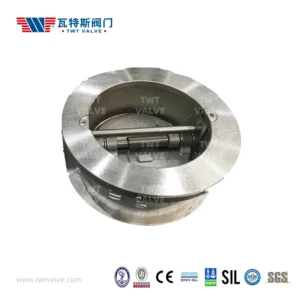What are the benefits of installing a stainless steel check valve?
Installing a stainless steel check valve in your plumbing system can provide several benefits, including:
Corrosion resistance: Stainless steel check valves are highly resistant to corrosion, which can prolong their lifespan and reduce the need for frequent replacement.
Durability: Stainless steel check valves are durable and can withstand high-pressure and high-temperature applications, making them suitable for a wide range of plumbing systems.
Reliability: Check valves are designed to prevent backflow and ensure the unidirectional flow of fluids. Installing a stainless steel check valve can provide reliable protection against backflow, which can help prevent damage to your plumbing system and ensure the safety of your water supply.
Low maintenance: Stainless steel check valves require minimal maintenance, which can save time and money over the lifespan of the valve. They are also easy to clean and sanitize, making them ideal for use in applications where cleanliness is important.
Energy efficiency: Check valves can help improve the efficiency of your plumbing system by reducing energy waste caused by backflow or leakage. By preventing backflow, stainless steel check valves can help maintain the optimal pressure and flow rate of your plumbing system, which can reduce energy consumption.
Drinking water safety: Stainless steel check valves that are certified to industry standards such as NSF/ANSI 61 or NSF/ANSI 372 can ensure the safety of your drinking water by preventing contamination or backflow of pollutants.
In summary, installing a stainless steel check valve in your plumbing system canprovide several benefits, including corrosion resistance, durability, reliability, low maintenance, energy efficiency, and drinking water safety. These benefits can help ensure the optimal performance and longevity of your plumbing system while also providing peace of mind knowing that your water supply is safe and protected against backflow and contamination.
How do I know if a stainless steel check valve is suitable for my plumbing system?
To determine if a stainless steel check valve is suitable for your plumbing system, consider the following factors:
Material compatibility: Check that the stainless steel used for the valve is compatible with the fluid or gas that will be flowing through your plumbing system. Some fluids or gases may react with certain types of stainless steel, causing corrosion or other issues.
Pressure and temperature ratings: Check the pressure and temperature ratings of the valve to ensure that it can handle the demands of your plumbing system. stainless steel check valve Make sure that the valve is rated for the maximum pressure and temperature that it will be exposed to in your plumbing system.
Flow rate: Determine the flow rate of your plumbing system and choose a valve that is suitable for the flow rate. If the flow rate is too high, the valve may not work effectively, and if the flow rate is too low, the valve may not open properly.
Size: Choose a valve that is the correct size for your plumbing system to ensure that it can handle the required flow rate and pressure.
Type of valve: Determine the type of check valve that is suitable for your plumbing system based on factors such as the flow rate and pressure of the fluid or gas, as well as the specific needs of your plumbing system.
Certifications: Check that the valve has appropriate certifications, such as NSF/ANSI 61 or NSF/ANSI 372, to ensure that it meets industry standards for drinking water safety.
Installation location: Determinethe best location for installing the valve in your plumbing system based on the specific needs of your system.
Compatibility with other components: Check that the valve is compatible with other components in your plumbing system, such as pipes, fittings, and pumps.
Professional advice: If you are unsure about which stainless steel check valve is suitable for your plumbing system, consider consulting with a professional plumber or valve supplier. They can provide guidance on the specific needs of your plumbing system and help you choose the best valve for your application.
In summary, to determine if a stainless steel check valve is suitable for your plumbing system, consider factors such as material compatibility, pressure and temperature ratings, flow rate, size, type of valve, certifications, installation location, compatibility with other components, and professional advice. By considering these factors, you can select a high-quality valve that meets the specific needs of your plumbing system and provides reliable performance over its lifespan.
